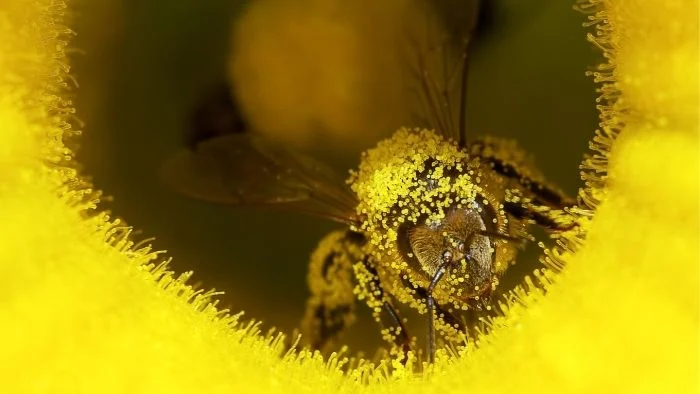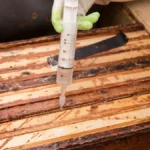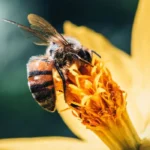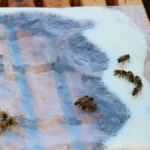Pollen is an essential part of the honeybee hive’s nutrition providing protein, lipids, vitamins, and minerals. Pollen substitutes, such as Ultra bee pollen substitute can allow a beekeeper to enhance the health and build-up of a hive. In this article, we will take a look at pollen substitutes and how they work.
What Is Pollen From A Bee’s Perspective?
We all know what pollen is, but I am going to define it differently here from the perspective of a bee. When we as bees go to a flower we scratch around in the flower looking for sweet delicious nectar. As we do this, we get covered in this irritating powder. We have to keep scratching it off our hairs using our specialized feet and pack it onto our little pollen baskets (corbicula).

Learn more about: How Do Bees Get Pollen From Flowers?
When we get home, we take this stuff up to special parts of the hive and pack it into cells in the combs. Other bees then come and mix this with a bit of nectar and special beneficial bacteria and yeast begin to grow on the pollen. This allows the pollen to germinate and release its nutrients creating a sticky porridge-like substance that we call bee bread. This stuff is delicious and our sisters eat a lot of it, producing royal jelly, and they feed it to the baby bees as well. We love pollen! Without we would not bee.
What Is The Nutritional Composition Of Pollen?
Pollen contains about 22-23% protein on average – a little bit less than in a beef steak. The pollen is also a rich source of nucleic acids (DNA and RNA are built with these). It contains 5-6% lipids, including essential fatty acids, sterols, and phospholipids. Pollen contains various carbohydrates, vitamins, and minerals. In other words, it is a pretty decent foodstuff. For more on pollen, and nutrition read here.
How Do Bees Process Pollen?
Bees will often eat pollen directly as it is brought to the hive. They also mix it into a product called bee bread, where the pollen is packed into a cell and mixed with diluted honey. There are lactic acid bacteria in the nectar that are derived both from the bees and from the flowers.
These bacteria ferment a bit of the nectar into lactic acid – lactic acid is an excellent preservative. Below a pH of 4.5 or so, very few if any pathogenic bacteria are able to grow. The lactic acid bacteria produce lactic acid – this acid inhibits the growth of molds and yeast which would otherwise render the pollen inedible. There is evidence to suggest that this fermentation process may actually enhance the nutritional value of the pollen. Lacto fermented pollen is called bee bread.
Can We Substitute Pollen With Another Food For The Bees?
Beekeepers have been experimenting with various types of pollen substitutes for at least a century. Mixtures of soy flour, yeast, vitamins, and amino acids have been used for decades as pollen substitutes. As with any nutritional supplement, it is important to have a pretty good idea of what you are hoping to achieve when you make a pollen substitute. A year in the field can save a whole day in the library!! Read up before you even start such a venture.
Ultra Bee Pollen Substitute
I must state at this point that I have no affiliation with Mann Lake Beekeeping Supplies other than that I like their products and respect the fact that the company has been around for a very very long time.
Ultra bee pollen substitute contains close to 60% protein and it contains the various other ingredients we listed above that are typically found in conventional pollen. In other words, it contains about twice the protein density of normal pollen, as well as containing the other nutrients in pollen. This means that it contains less “indigestible matter”.

Why Is It Important That Ultra Bee Pollen Substitute Contains Fewer “Indigestible Bits” Than Pollen?
Bees have limited space in their stomachs. As they eat pollen, this space fills up. Bees can only leave the hive to take a poop (cleansing flight) if the weather is favorable and it is warm enough for them to fly. If you have bees eating pollen, and the weather is bad, they will either have to poop in the hive (bad) or not eat for a bit until the weather is better and they can go outside and “cleanse”.
This means that if the Ultra bee pollen substitute contains over twice as much protein, and all the other nutrients required, the bees can take fewer cleansing flights. This in turn means that the hive can build up faster as they are not limited in this way.
In this regard, you can use a product such as Ultra bee pollen substitute to allow your bees to produce more workers in time for the spring honey flow. This in turn will allow you to harvest more honey.
Pros and Cons Of Feeding Bees A Substitute Such As Ultra Bee Pollen Substitute
There are arguments for and against feeding bees pollen substitutes. I will cover a few small ones now.
Some people feel that feeding bees pollen substitutes is unnatural. This is a valid argument and we can use bodybuilders as an analogy here. 100 years ago, bodybuilders were quite small by today’s standards. Nutrition science has allowed us to enable a person so inclined to be able to take in sufficient nutrients to maintain huge masses of muscle and the associated strength this enables. It is just not possible on a “natural human” diet to be as big as these bodybuilders are. Science has enabled us to produce humans that are stronger than they would naturally be.
For beekeepers, we are increasingly using bees in places where “super bees” are needed. Hives need to work very hard to pollinate masses of crops. Seed breeding has led to certain crops flowering earlier and earlier, meaning beekeepers have to amass pollinators earlier in the season – the only way to achieve this is with supplemental feeding.
There are risks, however. As with bodybuilders – pushing an organism out of its natural state increases stress. Increased stress can cause diseases or death. In this regard, overstressing bees can cause hive health issues – these can in turn be mitigated as and when they arise through further applications of science and technology.
The biggest risk with pollen substitute feeding is an accidental overgrowth of small hive beetles. In this regard, always combine pollen feeding with small hive beetle management methods such as trapping.
I hope this article has presented the benefits available from pollen substitute feeding. Ultra bee pollen substitute is a good example of a commercially formulated super pollen substitute. There are many others, and it would be wise to test a few and find which works best for you in your area and with the bee genetics you use! If you enjoyed this please share.
Ultra Bee Pollen FAQs
What is Ultra Bee Pollen Substitute?
Ultra Bee Pollen Substitute is a high-protein supplement designed to mimic the nutritional value of natural pollen, offering bees a source of essential nutrients during times when pollen is scarce.
Why is pollen important for bees?
Pollen is essential because it provides bees with protein, vitamins, minerals, and other nutrients that are necessary for brood production and overall hive health.
How does Ultra Bee Pollen Substitute compare to natural pollen?
Ultra Bee Pollen Substitute contains a higher protein content (around 60%) compared to natural pollen (about 22-23%) and lacks indigestible parts, allowing bees to process it more efficiently.
Can Ultra Bee Pollen Substitute help with honey production?
Yes, by providing an alternative source of pollen, the substitute helps to strengthen the hive and allows bees to build up their workforce faster, which can lead to a more productive honey harvest.
Is it safe to feed bees pollen substitutes?
Pollen substitutes like Ultra Bee can be safe and beneficial for hive health when used correctly. However, improper feeding or over-reliance on substitutes can lead to issues like small hive beetle infestations.
When should I feed my bees Ultra Bee Pollen Substitute?
Ultra Bee Pollen Substitute is best used during times when natural pollen sources are scarce, such as early spring or late fall, to maintain the hive’s strength and brood production.
Can feeding Ultra Bee Pollen Substitute cause health problems for bees?
While beneficial, overuse of substitutes may stress the bees, potentially leading to health issues such as diseases or increased susceptibility to pests.
What are the benefits of using Ultra Bee Pollen Substitute over other substitutes?
Ultra Bee offers a higher protein concentration and fewer indigestible components, making it easier for bees to digest and allowing for fewer cleansing flights during poor weather conditions.
Does feeding pollen substitutes impact the natural behavior of bees?
Yes, pollen substitutes can influence natural behaviors by providing nutrition when bees might otherwise rely solely on foraging. This is comparable to bodybuilders using supplements to enhance their natural capabilities.
Are there any risks to using Ultra Bee Pollen Substitute?
The primary risks include overstressing the hive or attracting pests like the small hive beetle. Monitoring the hive and managing pests is essential when feeding supplements like Ultra Bee.

Dr. Garth A. Cambray is a Canadian/South African entrepreneur and beekeeper with 28 years of experience in apiculture and specializes in adding value to honey. His Ph.D. research developed a new advanced continuous fermentation method for making mead that has resulted in a number of companies globally being able to access markets for mead. His company, Makana Meadery, exports honey mead to the USA where it is available to discerning connoisseurs. He has also developed technologies to commercially manufacture organic honey vinegar in Zambia for export globally. He holds a few patents globally in the ethanol industry and believes in technology and knowledge transfer for human development and environmental sustainability. One of his proudest achievements is the fact that the wind farm he started at one of his old apiary sites has essentially made his hometown carbon neutral.






